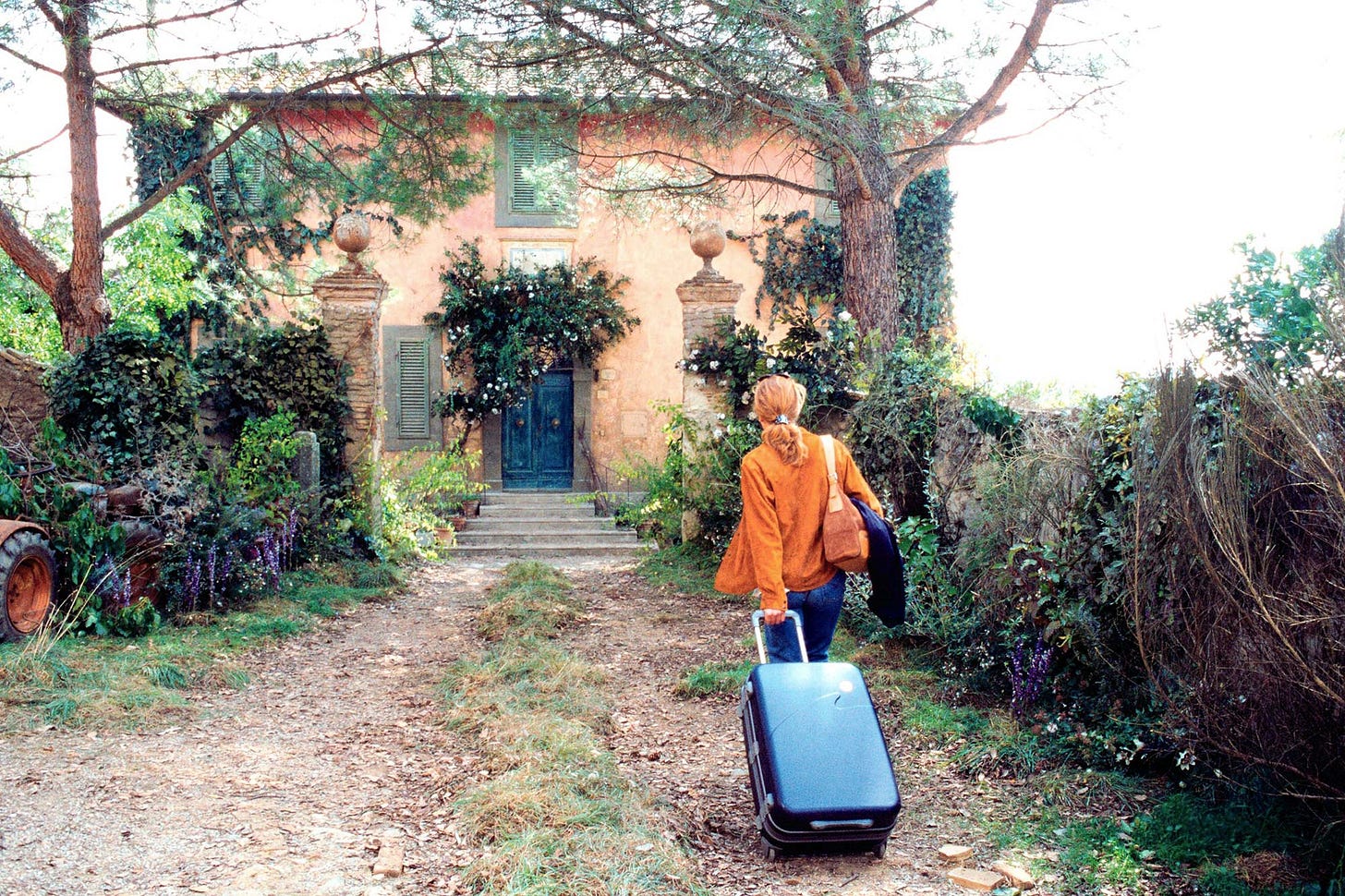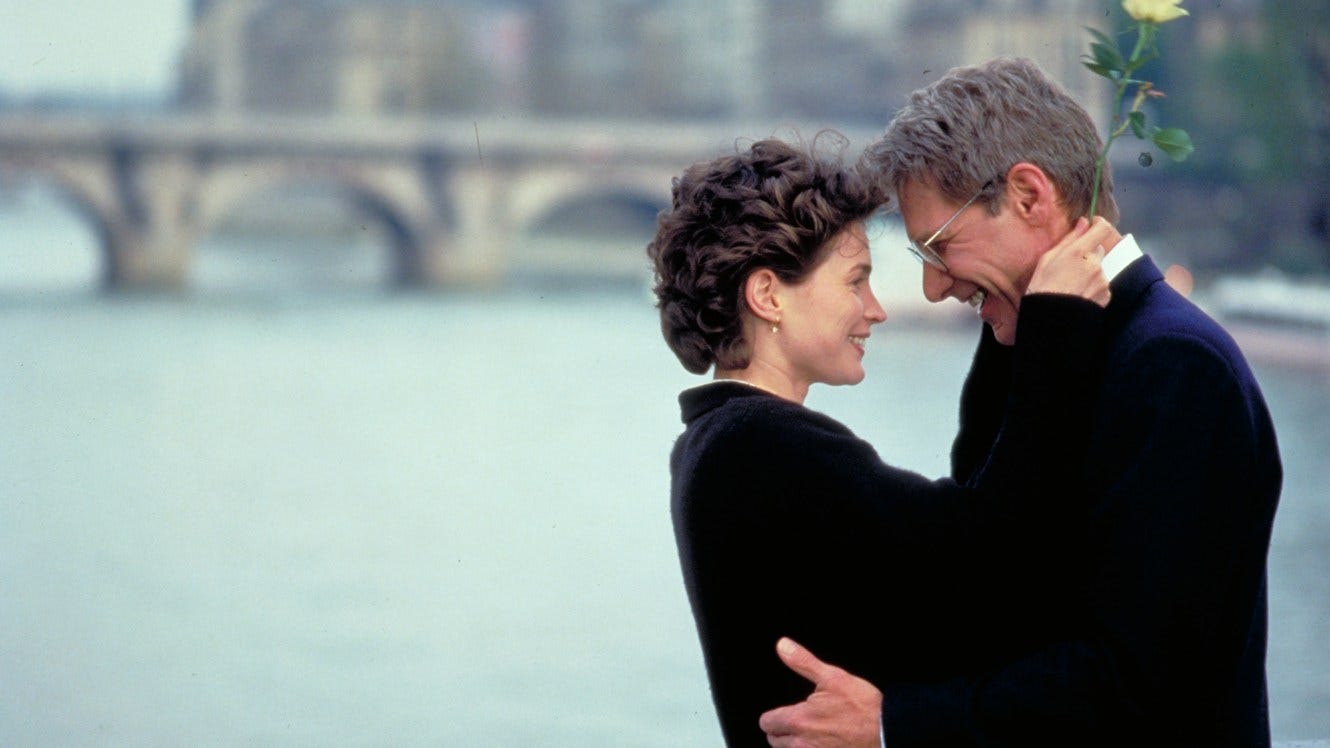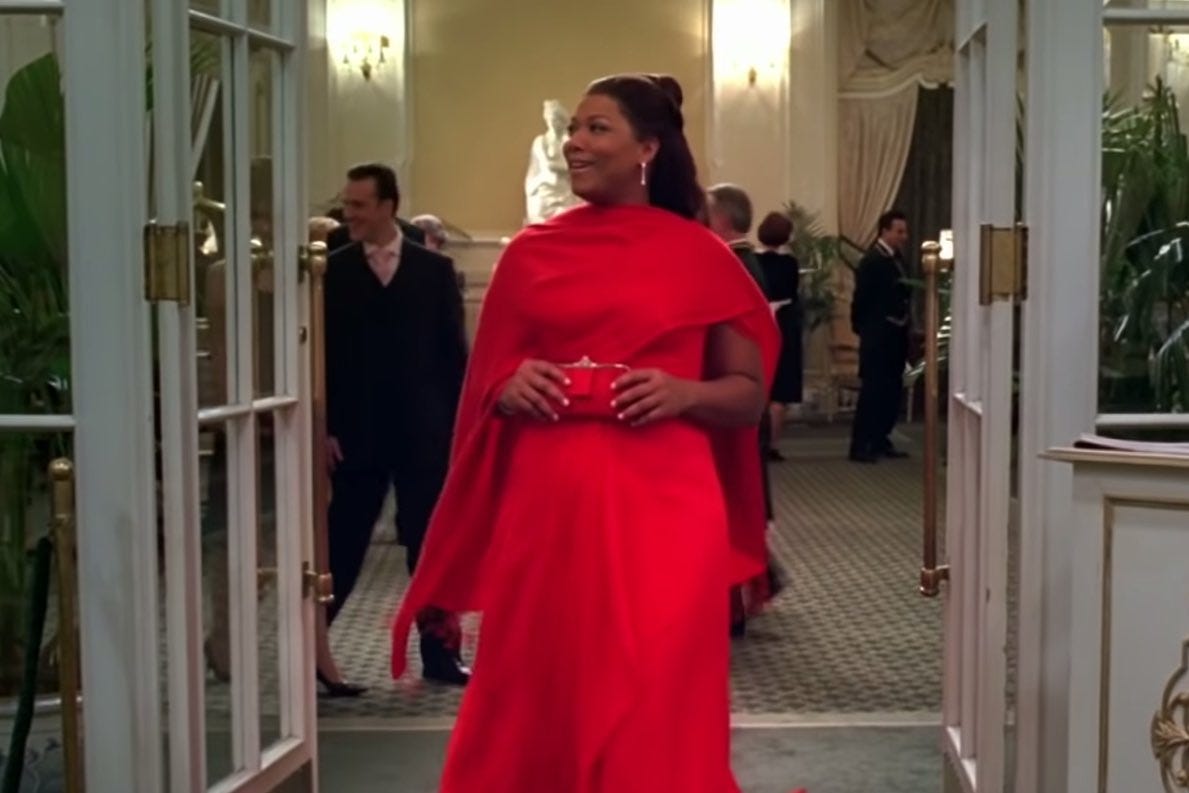The Great Escape
Under the Tuscan Sun, Sabrina (1995), Emily in Paris, Last Holiday, Queen Latifah, and escaping unhappiness
This is a loaded question, but how is everyone doing? I’m NOT GREAT BOB but I’m managing. I’d very much like to get out of America at the moment, but I’d settle for getting out of my zip code. (Honestly, I am doing pretty okay all things considered, but we’re rapidly approaching almost a full year without seeing my family. I’m pretty set on spending the upcoming holiday season inside my apartment on Zoom.)
I always joke that someday in the autumn of my life, I’ll just move to a vineyard in France, open a bed & breakfast, and spend my days writing, eating cheese, and drinking wine while various interesting guests breeze in and out of my estate. I’ve been to France exactly one time, and only to Paris, which is a lot different than rural France where most people do not also speak English to accommodate Americans (which is a thing on the new Netflix show Emily in Paris that I have inexplicably hate-watched 3 episodes of). Still, this idealized version of life in some quaint French village is something I’ve held onto and escaped into on particularly bad days in America (which is, frankly, like every single day right now).
I’m not ready to Eat Pray Love my life yet—though I’ve thought seriously about stress-eating every Italian carb I can get my hands on—but what is it with Americans and the myth of European escape? Why do we desperately want to leave the New World for the Old one whenever our lives start going awry? For a country founded on rebellion from Old World ideals and governance, Americans hold a peculiar obsession with The Continent and all its old-fashioned charms.
Recently, I re-watched Under the Tuscan Sun, starring Diane Lane and Sandra Oh, about a divorced writer named Frances (Lane) who goes on a trip to Tuscany at the suggestion of her best friend (Oh) and winds up buying a fixer-upper villa in a quaint village. There, she befriends her Polish construction workers, her kindly Italian real estate agent, and a British expat (Lindsay Duncan) who swans around like a glamorous Fellini film character. Frances is plucky and determined to transform her life as she transforms her villa but it’s easier said than done. Like the aforementioned Emily (in Paris lol), Frances doesn’t really speak much of the language, though she tries harder and far more subtly to assimilate than the former does in France. Still, Frances quickly realizes her dream of European escape is far more difficult in reality.

I hadn’t seen the movie since it originally came out in the early 2000s and had forgotten how sad and lovely it is. The marketing made it seem like a romantic comedy, but the truth is it’s more of a romantic drama with the romance really between a woman and herself (okay and the Italian countryside). Lane’s Frances is desperate to get her life going in any direction after a nasty divorce, but first she needs to figure out what she really wants vs what she actually needs. Buying the villa is impulsive and romantic, but as anyone who has watched hours of HGTV and every British home renovation show on Netflix (erm, I have) could tell you, old houses are a lot of work. Frances is utterly unprepared for dealing with old pipes, garden snakes, pesky electrical wiring, etc. She probably only thought as far as I have about my escape to rural France to run a B&B—which is mostly about good food and lazy days rather than “how would this actually work…and in a different country?”
Emily in Paris is like the last two episodes of Sex and the City where Carrie runs around the City of Light in Manolos and couture and reinforces every stereotype of narcissistic American tourists in Paris—except it has more subtlety than EIP, which is not saying much. Emily is like all of the worst stereotypes of Millennial white women rolled into one person who looks great in the strangest high fashion outfits (that no actual social media person could afford unless they already come from wealth) and speaks French like someone with a negative score on Duolingo. I don’t know if I’ll finish the rest of the season, but from only 3 episodes, Emily’s grating Americanness makes a case for how insular and self-absorbed Americans are in relation to the rest of the world—how we don’t emphasize learning other languages or appreciating cultures different from our own. The most truthful thing I heard came from Emily’s fab French boss (Philippine Leroy-Beaulieu, also in Call My Agent) who correctly stated most Americans treat Paris like a playground rather than a place where real people live and work—effectively bursting her idyllic European escapist dream.
One of my favorite comfort movies is the 1995 remake of Sabrina starring Julia Ormond, Harrison Ford, and Greg Kinnear. Sabrina, the mousy daughter of the chauffeur to the mega-wealthy Larrabee family—including grumpy older brother Linus (Ford) and handsome playboy younger brother David (Kinnear)—winds up spending a year living in Paris working for French Vogue on the recommendation of Larrabee matriarch, Maude (the wondrous Nancy Marchand). Sabrina assimilates far better than either Emily or Frances after some initial hilarious mishaps with language and fashion. She befriends her chic boss Irene (Fanny Ardant) and eventually takes an interest in photography thanks to her friend/brief lover Louis (Patrick Bruel). Sabrina returns to New York much older, wiser, and chicer having “found herself” in Paris (as she tells Linus in a later scene). The movie ends with her returning to Paris— “I was happy there” she says—only to be joined by Linus who has fallen in love with her. Both are escaping the unhappiness of their lives in New York and appear to have found it while they kiss passionately on one of the many bridges of Paris as the credits roll. Never mind the part where they are both—surprise!—millionaires.

Escapism isn’t necessarily a bad thing, but what about the people who can’t physically escape the way these white women do in movies and on TV? What about those of us who have no choice but to stay in less than ideal circumstances? Where is our escape? It says something that the only people capable of physical escape are typically the ones who already have pretty favorable living circumstances wherever they are—money, connections, healthcare, good job etc—but they still harbor a deep unhappiness with it all. Don Draper would say, “What is happiness? It’s a moment before you need more happiness.” Happiness, it seems, is as ambiguous as a European escape—what do either really mean?
A couple weeks ago, I caught the 2006 Queen Latifah rom-com Last Holiday again on cable. It’s about an overly cautious saleswoman named Georgia who moves to a glamorous European town and lives like a millionaire after she’s diagnosed with a terminal illness. Georgia wears couture and treats herself to every luxury she denied herself in her old life. Latifah—a dynamite multi-hyphenate entertainer—is warm, gracious, and utterly charming, making something memorable out of a perfectly fine movie that would be otherwise mostly forgettable. We learn she wasn’t really living her life back in New Orleans (ironic given its party party party atmosphere)—keeping all her dreams in a scrapbook marked “Possibilities” rather than really pursuing them. In her new Czech home and under the threat of certain death, Georgia begins to really thrive. She’s happy—mostly. Of course, by the end Georgia learns she has been misdiagnosed and returns to New Orleans to marry her longtime crush/co-worker Sean (LL Cool J) and open a restaurant. Her book of “Possibilities” becomes a book of “Realities.” She’s done what many of our other dreamers couldn’t.

Georgia is a different protagonist from our others for two very obvious reasons: her race and her class. As a Black woman in America, she is already at a disadvantage to her white counterparts in their films because of systemic racism, sexism, and wealth inequality. She makes less money, doesn’t come from a privileged background, and wouldn’t have been able to move to Europe without liquidating her entire life savings and some things her mother left her. The film doesn’t really say all this per se, but Georgia’s circumstances stand in stark contrast when you watch these other films featuring white female protagonists. For Georgia, her European escape is even more of a dream come true—there are very real problems contributing to her unhappiness in America. This is not to downplay the struggles of most of our white female protagonists, but their own privilege protects them from circumstances that are very real, awful, and inflict lasting harm on Black women—circumstances that truly warrant not just an escape but real solutions.
Maybe this is why, in certain respects, Last Holiday feels so much more satisfying as wish fulfillment—this is a woman who needs and deserves real happiness on so many levels. Queen Latifah has made more than a few movies that show Black women thriving like this (and she herself is a thriving Black woman). I can’t help thinking “happiness” within the context of most her films is about the joy that comes with freedom from the systemic injustices white women—like our other protagonists—have helped perpetuate in varying ways. In Queen Latifah’s movies, Black women get to laugh, fall in love, wear amazing clothes, have fancy meals, hang with their girlfriends—basically everything white women have gotten to do onscreen since the birth of cinema—and why shouldn’t they? This should be a daily reality instead of just something in a book of “possibilities” or a genre movie about European escapism.
With the election and all its implications hanging in the air, I think a lot about people who exclaim they will leave the U.S. if you-know-who gets reelected. 99% of them are white people—and a good amount of them women (understandably). Things are bad. A lot of us are deeply unhappy with the circumstances of our country. Europe, on the other hand, has mostly recovered from the pandemic and is returning to “normal” (whatever that means). They have plenty of systemic problems too, but there’s food and culture and universal healthcare and far more emphasis on making sure people’s circumstances are better overall so that people are happier overall. But for many of us, the realities of moving to another country at the drop of a Parisian beret are too difficult to ignore like Frances, Emily, or Sabrina. Many of us simply do not have the means—financially or otherwise—to turn such an idyllic escape into an actual reality unless it’s through tragic and/or extenuating circumstances like Georgia.
Movies can do many things—hold a mirror up to our lives, provide entertainment, be a source of comfort—but they are, above all, a form of escape. I don’t know if I’ll ever open a bed and breakfast in rural France, and as much as I’d like to escape this country if the election doesn’t turn out the way I hope, I know there are people who do not have my white privilege and have no choice but to stay even though the system was designed to fail and harm them. What about their happiness? What about their dreams? There are a lot of questions and not enough answers right now, but at least we can all escape in the movies—even if we can’t go there either right now.
Thanks so much for reading! As always, please drop me a line if you feel inclined.
You can visit my website here.
I’ll be sending my next monthly tarot card reading soon, so if you’d like to receive it, make sure to sign up for a paid subscription.
See you next time!
-Em



